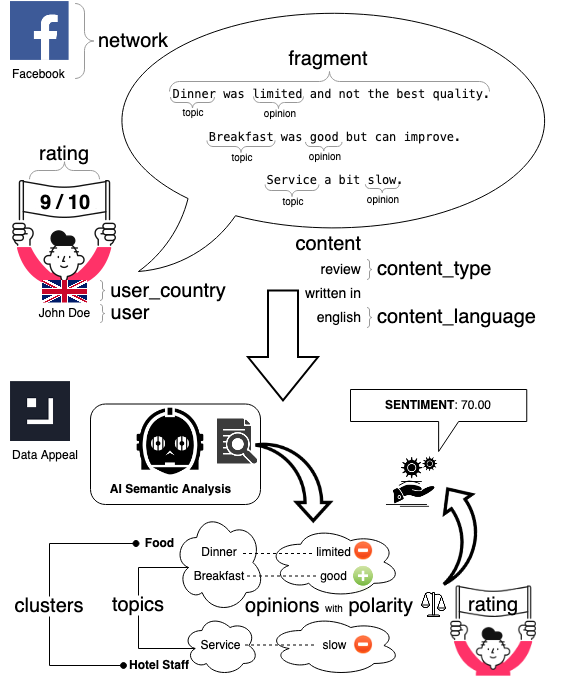▸ REPUTATION
Reputation API allows querying of historical reputational data provided by users about POIs within a location.
Each Reputation API call requires, in addition to a {Location} parameter set, a Timeframe [from,to], which identifies the time range the data has to be retrieved for.
Glossary
| Term | Meaning | Examples |
|---|---|---|
| content | Textual report on a network provided by a user who expresses opinions about topics. |
Dinner was limited and not the best quality. Breakfast was good but can improve. Service a bit slow. |
| content_type | Typology of a content, bounded to the typology of relative network. |
reviewtaggedpost |
| content_language | Language in ISO_639-1 standard format in which a content has been originally written. |
en |
| cluster | Super-set of topics which have similar argument pertinence. |
Dictionary |
| network | Web platform that users can feed with contents of judgement. |
Dictionary |
| opinion | Judgement expressed by a user on a topic. |
limitedgoodslow |
| polarity | Qualitative typology of an opinion. |
POSITIVENEGATIVENEUTRAL |
| rating | Numerical evaluation provided by a user on a POI. | 9/104/5 |
| sentiment | KPI percentage calculated on users opinions which indicates users global satisfaction about a POI. |
70.00 / 100 |
| topic | Subject on which users express opinions. |
dinnerbreakfastservice |
| user | Digital actor which feeds networks with contents. |
John Doe |
| user_country | Country of origin of a user. |
gb |
Process
Following schema shows a visual example about how reputational data is processed.

Timeframe
The timeframe extension for which querying data is allowed varies from a minimum of one week to a maximum of one year.
There are no past depth limitations for querying data, as far as data in the past is retrievable.
Naturally, reputational data can never be queried for a future timeframe.